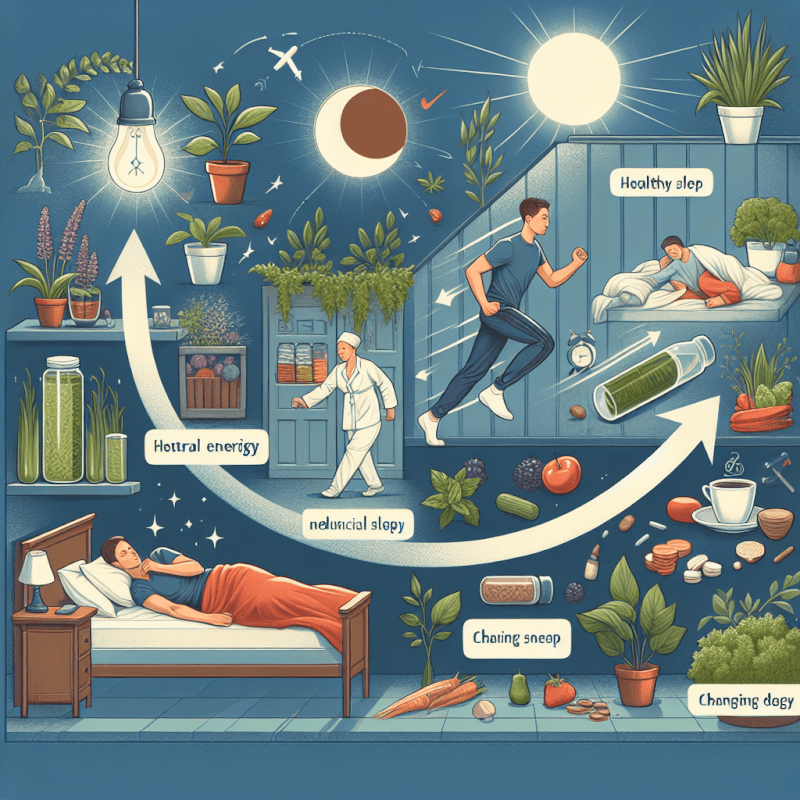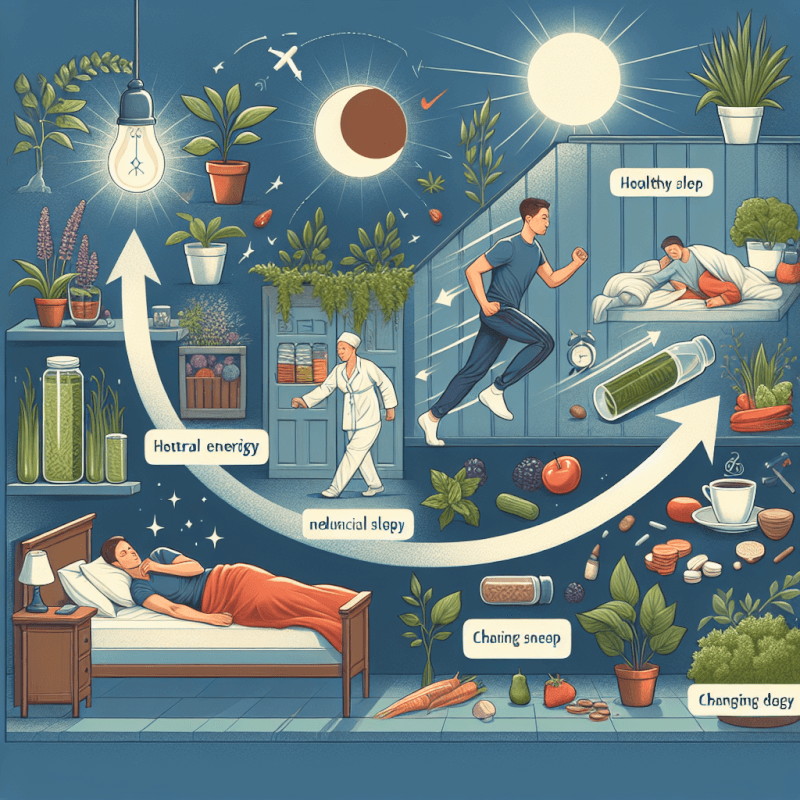Feeling drained and exhausted? We’ve all been there. In this article, you’re going to discover safe and effective ways to boost your energy levels naturally, without relying on copious amounts of caffeine or energy drinks. From lifestyle adjustments to incorporating specific foods into your diet, we’ll explore a range of practical strategies that will leave you feeling refreshed, rejuvenated, and ready to tackle whatever the day throws at you. So, if you’re eager to regain that vibrant, energetic feeling, keep on reading!

Exercise and Physical Activity
Cardiovascular Exercises
Cardiovascular exercises, also known as aerobic exercises, are a great way to boost your energy levels. These exercises involve repetitive movements that increase your heart rate and breathing rate, promoting better blood flow and oxygen delivery to your muscles and organs. Popular cardiovascular exercises include jogging, swimming, cycling, and dancing. By engaging in these activities regularly, you can improve your cardiovascular health, increase your stamina, and enhance your overall energy levels.
Strength Training
In addition to cardiovascular exercises, incorporating strength training into your fitness routine can also help boost your energy levels. Strength training involves using resistance, such as weights or resistance bands, to build and tone your muscles. When you engage in strength training, your muscles become stronger and more efficient, meaning you can perform everyday tasks with less effort and fatigue. This can lead to increased energy levels throughout the day, as your body becomes more resilient and less prone to exhaustion.
Yoga and Pilates
Yoga and Pilates are two forms of exercise that not only promote physical strength and flexibility but also contribute to improved energy levels. These practices focus on mindful movement, deep breathing, and body alignment, which can help reduce stress and improve mental clarity. By practicing yoga or Pilates regularly, you can enhance your body awareness, reduce muscle tension, and boost your energy levels. Additionally, these exercises often incorporate relaxation techniques, which can further promote better sleep and rest, contributing to overall increased energy levels.
Benefits of Regular Exercise
Engaging in regular exercise offers numerous benefits that can directly enhance your energy levels. Firstly, exercise stimulates the release of endorphins, which are natural chemicals in your brain that promote feelings of happiness and well-being. This boost in mood can help combat feelings of fatigue and lethargy, allowing you to approach your day with more energy and positivity. Additionally, exercise increases blood flow and oxygen delivery to your muscles and tissues, improving their function and reducing the likelihood of fatigue. Regular exercise also improves the quality of your sleep, which is essential for maintaining optimal energy levels. Lastly, exercise can help reduce stress and anxiety, both of which can drain your energy. By incorporating exercise into your daily routine, you can experience increased energy levels and an overall improved sense of well-being.
Sleep and Rest
Importance of Quality Sleep
Getting enough high-quality sleep is crucial for restoring and rejuvenating your body, and it plays a significant role in maintaining optimal energy levels. During sleep, your body repairs and regenerates tissues, consolidates memories, and balances hormone levels. Lack of quality sleep can result in daytime sleepiness, difficulty concentrating, irritability, and decreased energy levels. By prioritizing and consistently achieving a sufficient amount of quality sleep, you can improve your overall energy levels and enhance your productivity and focus throughout the day.
Establishing a Sleep Routine
Creating and sticking to a consistent sleep routine can greatly contribute to better sleep quality and improved energy levels. Establishing a regular sleep schedule involves going to bed and waking up at the same time every day, even on weekends. This helps regulate your body’s internal clock and promotes a natural sleep-wake cycle. Additionally, incorporating pre-sleep rituals, such as reading a book or taking a warm bath, can signal to your body that it’s time to wind down and prepare for sleep. By implementing a sleep routine, you can train your body to recognize and prioritize sleep, leading to more restful nights and higher energy levels.
Creating a Sleep-Friendly Environment
The environment in which you sleep can greatly impact the quality of your sleep and, consequently, your energy levels. To create a sleep-friendly environment, ensure that your bedroom is quiet, dark, and cool. Use blackout curtains or an eye mask to block out any unwanted light, invest in earplugs or a white noise machine to mask any disturbing noises, and regulate the temperature to a level that is comfortable for you. It’s also important to have a comfortable mattress, pillows, and bedding that support your body and promote a restful sleep. By optimizing your sleep environment, you can minimize disruptions and maximize the quality of your sleep, leading to higher energy levels during the day.
Relaxation Techniques for Better Sleep
Incorporating relaxation techniques into your bedtime routine can help calm your mind and body, preparing them for a restful sleep. Deep breathing exercises, progressive muscle relaxation, and meditation are examples of relaxation techniques that can promote better sleep. Deep breathing exercises involve inhaling deeply through your nose, holding your breath for a few seconds, and exhaling slowly through your mouth. This can help slow down your heart rate and relax your body, making it easier to fall asleep. Progressive muscle relaxation involves tensing and then relaxing each muscle group in your body, promoting physical and mental relaxation. Meditation focuses on clearing your mind and detaching from racing thoughts, allowing you to enter a state of deep relaxation. By incorporating these relaxation techniques into your nighttime routine, you can quiet your mind, release tension, and improve the quality of your sleep, ultimately leading to increased energy levels.
Nutrition and Hydration
Balanced and Nutrient-Dense Diet
Fueling your body with a balanced and nutrient-dense diet is essential for maintaining optimal energy levels. A balanced diet includes a variety of foods from different food groups, such as fruits, vegetables, whole grains, lean proteins, and healthy fats. These foods provide the necessary nutrients, vitamins, and minerals your body needs to function properly and sustain energy throughout the day. Incorporating nutrient-dense foods, such as leafy greens, berries, nuts, and lean proteins, into your meals and snacks can help stabilize your blood sugar levels, prevent energy crashes, and promote long-lasting energy.
Importance of Breakfast
Breakfast is often referred to as the most important meal of the day, and for good reason. Eating a nutritious breakfast kickstarts your metabolism, provides your body with energy, and sets the tone for the rest of the day. Including a combination of complex carbohydrates, protein, and healthy fats in your breakfast can provide sustained energy throughout the morning, prevent mid-morning energy slumps, and improve focus and concentration. Opt for options like whole-grain toast with avocado and eggs, Greek yogurt with berries and nuts, or oatmeal with nut butter and fruits to fuel your body and jumpstart your energy levels in the morning.
Hydration and Energy Levels
Staying properly hydrated is crucial for maintaining optimal energy levels. Dehydration can lead to feelings of fatigue, dizziness, and decreased cognitive function. Ensure you’re drinking enough water throughout the day to stay hydrated and energized. The general recommendation is to consume at least 8 cups (64 ounces) of water daily, but individual needs may vary based on factors such as activity level, climate, and overall health. It’s important to listen to your body’s thirst cues and drink water before, during, and after physical activity to replace any fluids lost through sweat. Additionally, incorporating hydrating foods, such as fruits and vegetables with high water content, can also help contribute to your daily hydration needs.
Foods That Boost Energy
Certain foods can provide a natural energy boost and sustain your energy levels throughout the day. Incorporating these foods into your diet can help combat fatigue and enhance overall vitality. Foods that are rich in complex carbohydrates, such as whole grains, legumes, and starchy vegetables, provide a steady release of energy due to their slow digestion and absorption. Additionally, foods high in iron, such as lean red meat, spinach, and lentils, can help prevent iron-deficiency anemia, which is often associated with low energy levels. Including foods with high levels of vitamins and minerals, such as fruits, vegetables, and nuts, can also promote energy production and overall well-being. However, it’s important to note that while these foods can support energy levels, they should be consumed as part of a balanced diet and not relied upon as quick fixes for long-term energy management.
Stress Management
Identifying and Managing Stressors
Recognizing and addressing the sources of stress in your life is vital for managing your energy levels effectively. Start by identifying the specific circumstances, activities, or people that contribute to your stress. Once you have identified these stressors, explore strategies to manage or mitigate their impact on your overall well-being. This can involve setting boundaries, learning to say no, or seeking support from loved ones or professionals. By actively managing your stressors, you can prevent them from draining your energy and negatively impacting your physical and mental health.
Deep Breathing and Meditation
Deep breathing exercises and meditation techniques are powerful tools for managing stress and replenishing energy. Deep breathing involves taking slow, deep breaths, focusing on inhaling through your nose, and exhaling through your mouth. This type of controlled breathing activates the body’s relaxation response, reducing stress and promoting a sense of calm. Meditation involves quieting the mind and mentally focusing on a specific object, word, or thought. Regular practice of deep breathing and meditation can help reduce stress, anxiety, and fatigue, allowing you to recharge and maintain steady energy levels.
Regular Relaxation Techniques
Incorporating regular relaxation techniques into your daily routine can help alleviate stress and rejuvenate your energy levels. These techniques can include activities such as reading a book, taking a warm bath, practicing yoga or Tai Chi, listening to calming music, or engaging in a hobby that brings you joy. By dedicating time each day to engage in activities that promote relaxation, you can combat the negative effects of stress and replenish your energy reserves.
Setting Boundaries and Prioritizing Self-Care
Setting clear boundaries and prioritizing self-care is crucial for effectively managing stress and maintaining optimal energy levels. This involves learning to say no to activities or commitments that do not align with your priorities or values. By focusing on activities that bring you joy, replenish your energy, and promote self-care, you can better navigate stressors and balance your overall well-being. Setting boundaries also means recognizing your limits and being mindful of when you need to take a break or ask for help. Prioritizing self-care allows you to recharge physically, mentally, and emotionally, ensuring you have the energy to tackle daily challenges and maintain a healthy work-life balance.

Supplements and Vitamins
Natural Energy Supplements
While it’s important to prioritize a balanced diet and healthy lifestyle for optimal energy levels, there are certain natural energy supplements that may provide an extra boost when needed. These supplements often contain ingredients such as ginseng, guarana, or green tea extract, which are known to enhance alertness and combat fatigue. However, it’s essential to consult with a healthcare professional before starting any new supplement regimen to ensure it’s safe and appropriate for you.
Vitamin B12 and Iron
Vitamin B12 and iron are two essential nutrients that play a crucial role in energy production and overall vitality. Vitamin B12 is involved in the production of red blood cells, which carry oxygen throughout the body, while iron is necessary for the formation of hemoglobin, a protein that transports oxygen in the blood. Deficiencies in these nutrients can lead to fatigue and decreased energy levels. Therefore, ensuring an adequate intake of foods rich in vitamin B12, such as meat, fish, dairy products, and fortified cereals, as well as iron-rich foods like lean red meat, spinach, and legumes, can help support energy production and prevent deficiencies.
Omega-3 Fatty Acids
Omega-3 fatty acids are a type of healthy fat found in fatty fish, flaxseeds, chia seeds, and walnuts. These essential fatty acids are not produced by the body and must be obtained through diet or supplements. Omega-3 fatty acids have been shown to support brain function, reduce inflammation, and improve mood, all of which can contribute to enhanced energy levels. Incorporating omega-3 fatty acids into your diet can help support overall well-being and brain health, potentially leading to increased energy and mental clarity.
Consulting a Healthcare Professional
While certain supplements and vitamins may support energy levels, it’s crucial to consult with a healthcare professional before starting any new regimen. They can assess your individual needs, identify any potential interactions or contraindications, and guide you in selecting the most appropriate supplements or vitamins for your specific situation. A healthcare professional can also monitor your progress and help determine the most effective and safe approach to managing your energy levels.
Reduce Energy Zappers
Limit Caffeine and Alcohol
While caffeine and alcohol may provide temporary energy boosts or relaxation, excessive consumption can negatively impact your energy levels. Caffeine, often found in coffee, tea, energy drinks, and some sodas, can disrupt sleep patterns and lead to energy crashes. Alcohol, on the other hand, can interfere with the quality of your sleep and cause dehydration, both of which can leave you feeling fatigued. To manage your energy levels effectively, limit your caffeine intake and be mindful of your alcohol consumption, taking care not to rely on these substances as quick fixes for long-term energy management.
Manage Screen Time
Excessive screen time, whether it’s from smartphones, tablets, computers, or television, can lead to mental fatigue and drain your energy levels. Spending extended periods in front of screens can strain your eyes, disrupt your sleep patterns, and contribute to feelings of overwhelm or information overload. To reduce the impact of excessive screen time on your energy levels, take regular breaks, practice the 20-20-20 rule (every 20 minutes, look at something 20 feet away for 20 seconds), and establish screen-free zones or designated periods of time throughout your day.
Avoid Smoking and Vaping
Smoking and vaping not only pose significant health risks but can also negatively affect your energy levels. The nicotine in tobacco products acts as a stimulant and can disrupt your ability to achieve restful sleep. The chemicals inhaled from vaping products can also impact your respiratory health, leading to decreased lung capacity and oxygen delivery to your body’s tissues. By avoiding smoking and vaping, you can protect your overall well-being and maintain healthier energy levels.
Avoid Excessive Sugar Consumption
Consuming excessive amounts of sugary foods and beverages may provide a temporary energy boost, but it can lead to an energy crash shortly after. These quick spikes and drops in blood sugar can result in feelings of lethargy, mood swings, and decreased overall energy levels. To manage your energy effectively, limit your intake of sugary treats and opt for healthier alternatives that provide sustained energy, such as complex carbohydrates, lean proteins, and nutrient-dense foods.

Manage Daily Routine
Prioritize Tasks and Delegate
Managing your daily routine and energy levels involves prioritizing tasks and allocating your time and resources accordingly. Start by identifying your most important tasks or goals for the day and ensure you give them the attention they deserve. Delegate or outsource tasks that are less essential or that can be handled by others, freeing up your energy and time for more important responsibilities. By focusing on what matters most and reducing unnecessary stress, you can optimize your energy levels and accomplish tasks more efficiently.
Utilize Time-Management Techniques
Time-management techniques can help you make the most of your day and ensure you have enough energy for all your commitments. Some popular techniques include creating to-do lists, setting realistic deadlines, breaking tasks into smaller, manageable chunks, and prioritizing tasks based on importance and urgency. Experiment with different techniques and find what works best for you to optimize your productivity and leave room for self-care and relaxation.
Take Regular Breaks
Taking regular breaks throughout your day is essential for maintaining energy levels and preventing burnout. Engaging in activities like stretching, going for a short walk, or practicing relaxation techniques during breaks can help refresh your mind and body, making you more productive and focused when you return to your tasks. Avoid the temptation to power through without breaks, as this can lead to decreased energy and diminished overall performance. By incorporating regular breaks into your daily routine, you can sustain your energy levels and maintain productivity throughout the day.
Avoid Overcommitment and Multitasking
Overcommitting and multitasking can quickly deplete your energy levels and contribute to increased stress. It’s important to be realistic about what you can handle and to say no when necessary. By avoiding overcommitment, you can maintain a healthy work-life balance and have enough energy to tackle both professional and personal responsibilities effectively. Similarly, resist the urge to multitask, as it can lead to decreased productivity and increased mental fatigue. Instead, focus on one task at a time, dedicating your energy and attention fully to each one before moving on to the next.
Get Sunlight and Fresh Air
Benefits of Natural Light
Exposure to natural light plays a crucial role in regulating your circadian rhythm, which is responsible for your sleep-wake cycle. Spending time in natural light during the day can help synchronize your internal clock, improve your mood, and boost your overall energy levels. Open your curtains, go for a walk outside, or sit near a window to maximize your exposure to natural light. Incorporating natural light into your daily routine can help regulate your sleep patterns and enhance your energy levels.
Step Outdoors and Connect with Nature
Spending time outdoors and connecting with nature can have a profound impact on your energy levels and overall well-being. Nature has a calming effect on the mind and body, reducing stress and enhancing mood. Even a brief walk or spending a few minutes in a local park can provide a much-needed energy boost and mental refreshment. Make it a habit to get outdoors regularly, whether it’s for a walk, gardening, or simply enjoying your lunch outside. By immersing yourself in nature, you can recharge your energy levels and experience the positive benefits of being in touch with the natural world.
Take Walking Breaks
Incorporating walking breaks into your daily routine is an excellent way to recharge your energy levels and combat sedentary behavior. Sitting for extended periods can lead to feelings of fatigue and decreased productivity. Taking short walking breaks, whether it’s a stroll around the office or a lap around the block, can boost circulation, increase oxygen flow, and promote mental clarity. By incorporating walking breaks into your daily routine, you can prevent energy slumps and maintain your focus and energy levels throughout the day.
Importance of Fresh Air
Fresh air is essential for maintaining optimal energy levels and promoting overall well-being. Indoor air can often be stagnant and contaminated with pollutants, leading to feelings of lethargy and poor air quality. Opening windows or doors to allow fresh air into your living or working spaces can improve ventilation and oxygen flow, revitalizing your mind and body. Taking deep breaths of fresh air can help increase alertness, clarity, and overall energy levels. Additionally, spending time in outdoor environments with fresh air, such as parks or green spaces, can provide additional benefits to your energy levels and overall health.

Stay Socially Engaged
Maintain Healthy Relationships
Maintaining healthy relationships with friends, family, and loved ones is vital for your mental and emotional well-being, as well as your overall energy levels. Spending time with supportive and uplifting individuals can have a positive impact on your mood, reducing stress and boosting your energy. Cultivate and nurture relationships that bring you joy, offer support, and encourage positivity. By staying socially engaged, you can enhance your overall well-being and maintain higher energy levels.
Avoid Isolation and Loneliness
Isolation and loneliness can have a detrimental effect on your energy levels and mental health. Humans are social beings, and regular social interaction is essential for maintaining a sense of connection and belonging. Make an effort to engage with others regularly, whether it’s through face-to-face interactions, phone calls, or virtual meetups. Seek opportunities to connect with friends, join clubs or organizations, or participate in community events. By actively combatting isolation and loneliness, you can boost your energy levels and improve your overall quality of life.
Participate in Social Activities
Engaging in social activities can provide a much-needed energy boost and renew your sense of purpose and enjoyment. Participate in activities that align with your interests and passions, whether it’s joining a sports team, attending social events, or volunteering for a cause you believe in. These activities can provide a sense of fulfillment, increase social connections, and promote a positive mindset, all of which contribute to higher energy levels and greater overall well-being.
Join Supportive Communities
Being part of supportive communities can enhance your energy levels and provide a valuable network of like-minded individuals. Seek out communities or organizations that share your interests, hobbies, or goals. Connecting with individuals who understand and support your journey can provide a sense of belonging, foster positive relationships, and boost your energy levels. Whether it’s an online forum, a local club, or a support group, joining a community can contribute to increased energy, motivation, and overall life satisfaction.
Professional Help and Evaluation
Consulting a Healthcare Provider
If you consistently struggle with low energy levels despite implementing lifestyle changes, it may be beneficial to consult with a healthcare provider. They can assess your overall health, identify any underlying medical conditions that may be contributing to your energy levels, and develop an appropriate management plan. A healthcare provider can also assist in determining if any supplements or medications are necessary to support your energy levels safely and effectively.
Identifying Underlying Medical Conditions
Several medical conditions can contribute to persistent low energy levels, such as thyroid disorders, anemia, chronic fatigue syndrome, or depression. If you suspect an underlying medical condition, it’s important to consult with a healthcare provider for proper diagnosis and treatment. By addressing the root cause of your low energy levels, you can take steps towards managing and improving your overall energy and well-being.
Getting Regular Check-ups
Routine check-ups with your healthcare provider are essential for maintaining optimal health and identifying any potential health concerns that may impact your energy levels. Regular check-ups allow your healthcare provider to monitor your overall well-being, assess any changes in your health, and provide appropriate guidance or treatment. By staying proactive with your healthcare, you can address any potential issues that may be affecting your energy levels and take necessary steps to manage them effectively.
Seeking Therapy or Counseling
Persistent low energy levels can sometimes be linked to mental health concerns, such as anxiety or depression. If you find that your low energy levels are accompanied by persistent feelings of sadness, lack of motivation, or other emotional difficulties, it may be beneficial to seek therapy or counseling. These professionals can provide support, guidance, and evidence-based strategies to improve your mental health and overall energy levels. By addressing any underlying mental health concerns, you can take significant steps towards managing and improving your energy levels.



